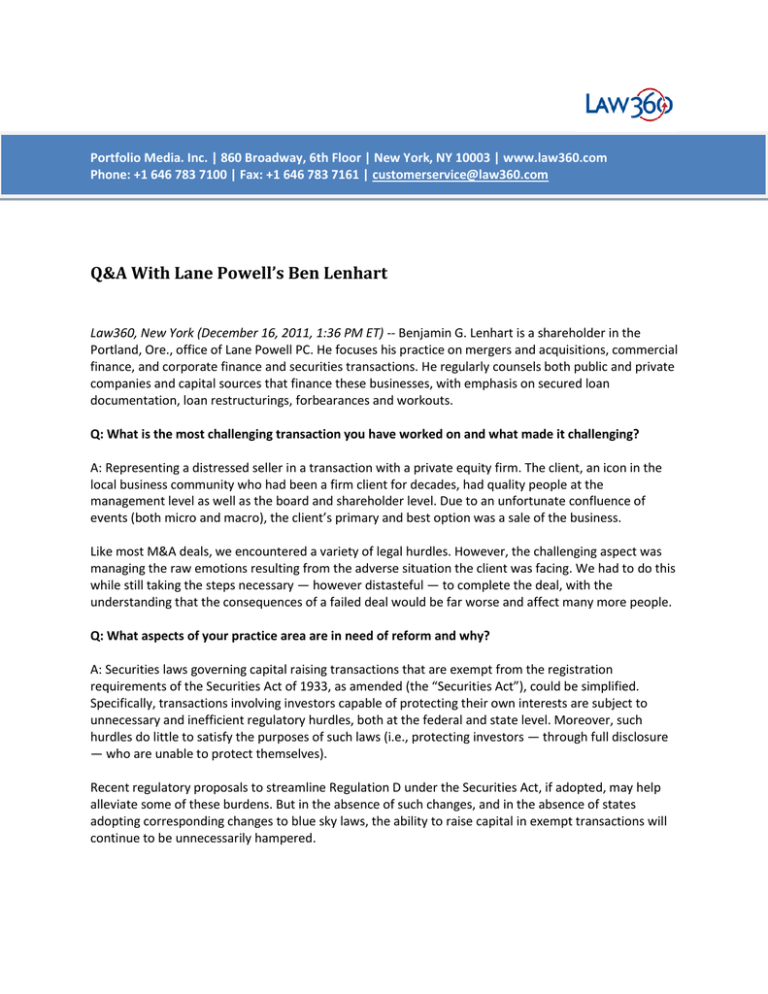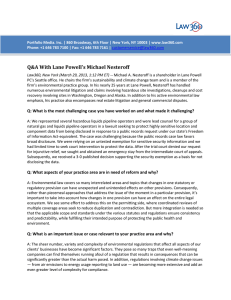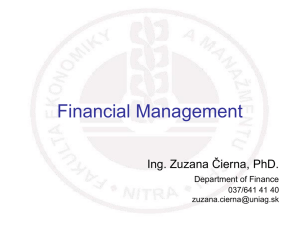Portfolio Media. Inc. | 860 Broadway, 6th Floor | New...
advertisement

Portfolio Media. Inc. | 860 Broadway, 6th Floor | New York, NY 10003 | www.law360.com Phone: +1 646 783 7100 | Fax: +1 646 783 7161 | customerservice@law360.com Q&A With Lane Powell’s Ben Lenhart Law360, New York (December 16, 2011, 1:36 PM ET) -- Benjamin G. Lenhart is a shareholder in the Portland, Ore., office of Lane Powell PC. He focuses his practice on mergers and acquisitions, commercial finance, and corporate finance and securities transactions. He regularly counsels both public and private companies and capital sources that finance these businesses, with emphasis on secured loan documentation, loan restructurings, forbearances and workouts. Q: What is the most challenging transaction you have worked on and what made it challenging? A: Representing a distressed seller in a transaction with a private equity firm. The client, an icon in the local business community who had been a firm client for decades, had quality people at the management level as well as the board and shareholder level. Due to an unfortunate confluence of events (both micro and macro), the client’s primary and best option was a sale of the business. Like most M&A deals, we encountered a variety of legal hurdles. However, the challenging aspect was managing the raw emotions resulting from the adverse situation the client was facing. We had to do this while still taking the steps necessary — however distasteful — to complete the deal, with the understanding that the consequences of a failed deal would be far worse and affect many more people. Q: What aspects of your practice area are in need of reform and why? A: Securities laws governing capital raising transactions that are exempt from the registration requirements of the Securities Act of 1933, as amended (the “Securities Act”), could be simplified. Specifically, transactions involving investors capable of protecting their own interests are subject to unnecessary and inefficient regulatory hurdles, both at the federal and state level. Moreover, such hurdles do little to satisfy the purposes of such laws (i.e., protecting investors — through full disclosure — who are unable to protect themselves). Recent regulatory proposals to streamline Regulation D under the Securities Act, if adopted, may help alleviate some of these burdens. But in the absence of such changes, and in the absence of states adopting corresponding changes to blue sky laws, the ability to raise capital in exempt transactions will continue to be unnecessarily hampered. Q: What is an important deal or issue relevant to your practice area and why? A: I believe one of the most important issues facing us — and it is not specific to private equity, M&A or even the practice of law — is the ability of our nation’s politicians to navigate the next 24 to 36 months. There is a growing gulf between the political parties that must be bridged. If the extreme partisanship evident in the debt ceiling debacle continues, we could easily fall into another, and more prolonged, recession, which in turn will adversely impact the credit markets and chill the market for continuing investments of all kinds. Conversely, our politicians have an opportunity to be true statesmen and rise to the challenge of addressing the serious economic problems facing our nation. Whether you support the Tea Party, Occupy Wall Street, or some other movement, our nation’s ability to grow and thrive will require everyone to make sacrifices and find common ground. Q: Outside your own firm, name an attorney in your field who has impressed you and explain why. A: One fabulous aspect of working on M&A transactions (whether private equity or other) has been the opportunity to work with a number of very talented lawyers across the country (and, unfortunately, a few obnoxious ones), from New York, Boston, San Francisco, Chicago and Seattle, among others. In almost every one of these transactions, I have been fortunate to see a variety of styles and have tried to emulate, to the extent it was consistent with my personality, those behaviors I admired and found to be successful. On one recent deal involving a contentious spin-out of a company in a second-generation family-owned business, I had the opportunity to work as co-counsel with Cara Lowe of Stein & Lubin LLP. What I really appreciated about Cara’s style was her ability (which seemed effortless) to communicate in a constructive and nonconfrontational manner with opposing counsel, despite the adversarial posture of both clients. Q: What is a mistake you made early in your career and what did you learn from it? A: One mistake I made as a young lawyer was working to the exclusion of all else (i.e., family, friends, vacations, holidays and my health, to name a few things). Long hours, particularly in the midst of an M&A deal, are part of the territory (and, at least most of the time, the thrill of a deal can be addictively fun, which I think makes me a deal junkie). The long hours helped make me a better lawyer. However, the costs of neglecting other areas of one’s life were significant. Until a universally accepted replacement for the billable hour arrives, long hours will continue to rule the day. But my experience has taught me at least three things: (1) learning to better manage my time (and to say no once in a while) has helped me achieve a more respectable life balance; (2) being present in the moment, as trite as it sounds, matters; and (3) being part of a bigger team that truly works together (which I am fortunate enough to have) and fosters the sharing of workloads in a way that allows for more balance that might otherwise not be available. All Content © 2003-2011, Portfolio Media, Inc.



